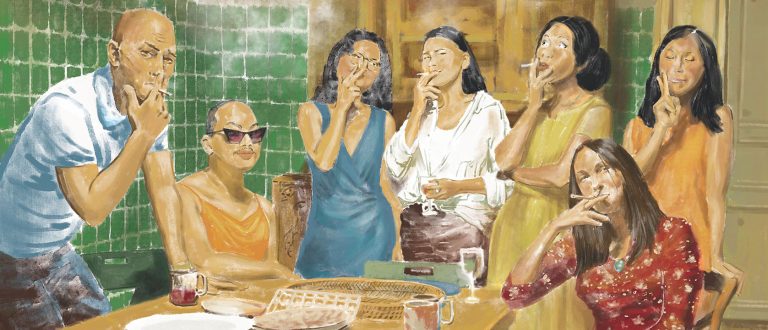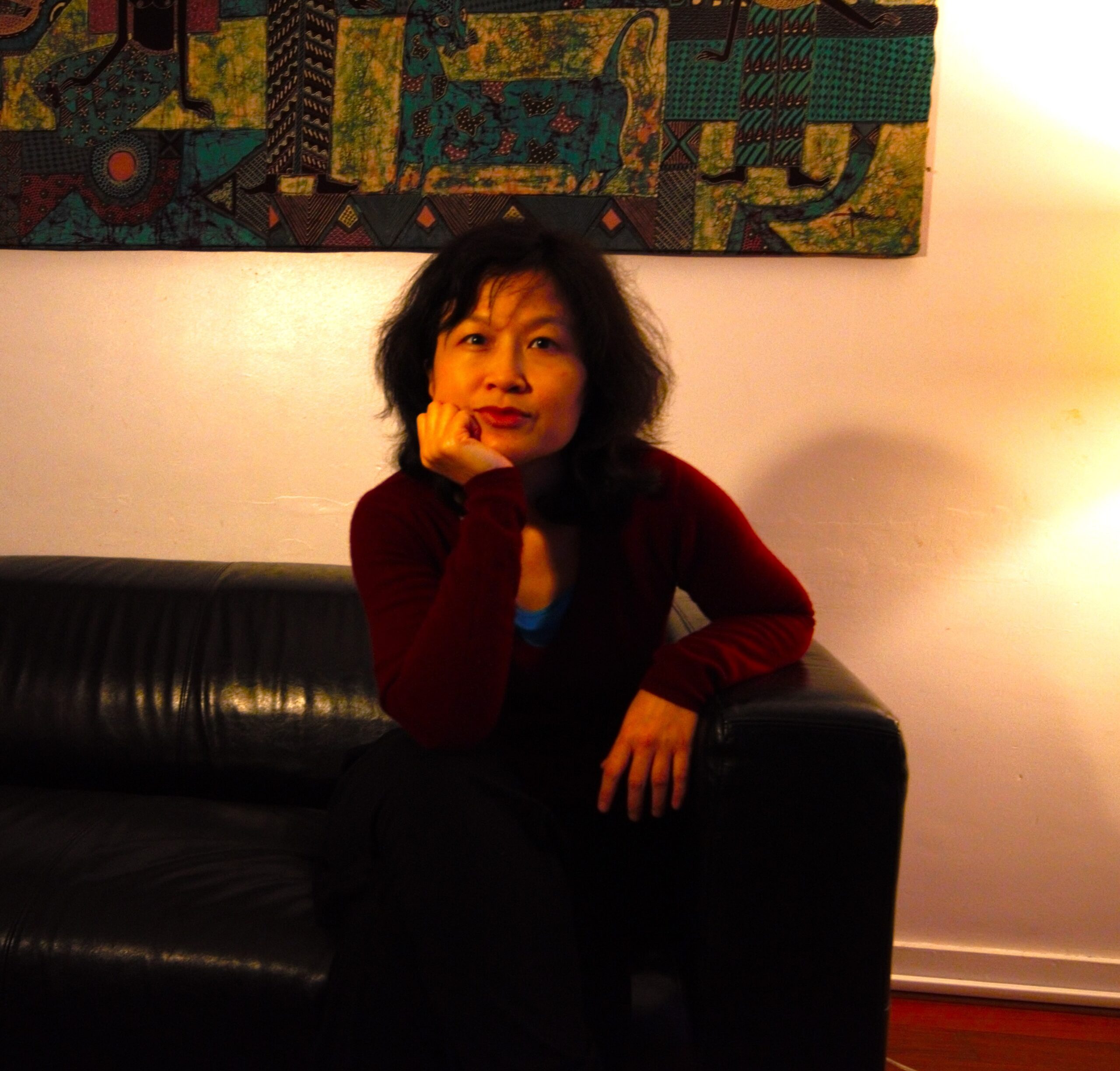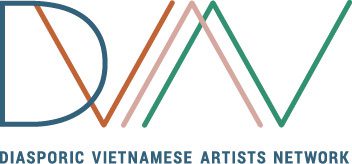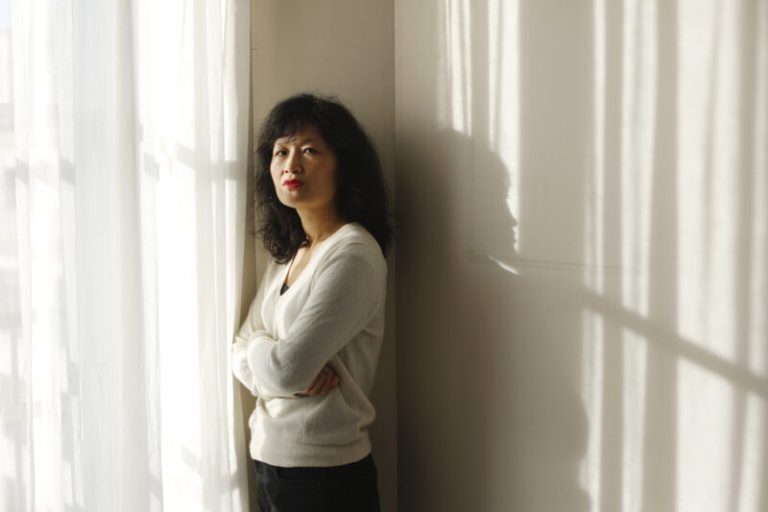
Doan Bui
Writer, journalist
Spring 2025

- Literature
- New York
- San Francisco
“The “island” is a metaphor for exile. When people lose their home country, they lose their gravity center. Afterwards, they create their own islands, like a small “nha”, a word in vietnamese that means home and family.”
Our lives are like spider webs. It’s a fine tapestry, weaved with threads, invisible but very strong. I had been writing about migrants and refugees for more than 20 years, but for a long time, I didn’t realize I was following this thread, trying to understand my family history, who flew from Vietnam, trying to put words on the silences and all that had been untold: my father is aphasic since almost 20 years. I am still following this very thread, in my work as a journalist, covering war in Ukraine, or in my fiction work. My first novel la Tour was an homage to La vie mode d’emploi from George Perec, relocated in a high rise buildings in the parisian Chinatown, where my characters lived: a vietnamese boat people family but also a senegalese clandestine migrant who loves Marcel Proust, and even a white supremacist, who thinks he is Michel Houellebecq’s puppy dog. “Le monde De Nulle Part is also a perecian hommage, to W ou le souvenir d’enfance. George Perec wrote about Ellis Island, and like him, I am fascinated with islands, as places where stories are just waiting for us. Asking to be written. Islands are places haunted with ghosts, loaded with history and stories. And such is Angel Island and Hart Island that I want to explore, who unveiled a darker side of American history, places of relegation. As a Vietnamese, I do believe in ghosts. So I write. Because writing is a way to invoke ghosts.
Doan Bui is a writer and journalist. She was awarded “Prix Albert Londres” for her work about refugees. Her memoir, “Le silence de Mon père”, published in 2016, won “Prix de la porte Dorée” and “Prix Amerigo Vespucci”. La Tour (Editions Grasset), fiction novel (2022) was shortlisted for Goncourt premier roman and Orange Prize. Le Monde de Nulle part is published in september 2024. She is also scenarist for graphic novels, C’est quoi un terroriste, Fake News with illustrator Leslie Plée, co-author with writer Isabelle Monnin of Ils sont devenus Français (2011), with ukrainian writers Pavlo and Viktoria Matyusha Lettres d’amour et de Guerre, with photographer Patrick Messina Histoires de VIH.
“I ate wind and tasted waves for more than twenty days” These are one of the words of the poems that were found on the wall of the detention center of Angel Island, Angel Island, in San Francisco bay, the less known Ellis Island of the West. Those poems remind me of all the lost objects, photos, and sometimes papers I found on Lampedusa beaches or in Lesbos Island. Or in the wreckages, in Irpin or Bucha … .Shards of broken lives. Contrary to Ellis Island, which screened mainly people from Europe, Angel Island had mainly non-white immigrants, a majority of Chinese, Filippino, Mexican, Japanese, Vietnamese. Is the reason why it served more to screen, exclude and deport? Because they were considered the “bad immigrants” Americans didn’t want, going as far as to promulgate a Chinese Exclusion act? Asian people have been targeted during Covid, accused of transmitting the virus, and centuries ago, it was the same: they would be accused of disseminating the bubonic plague.
On the other side of the US, not so far from Ellis Island, Hart Island was also such a place. An island which served as a cemetery, especially when the bodies were considered to be contagious: it would be the place where many Aids Victims would be buried. The “island” is a metaphor for exile. When people lose their home country, they lose their gravity center. Afterwards, they create their own islands, like a small “nha”, a word in vietnamese that means home and family. When you have to survive in camps, and other transitory places, after having lost everything, you recreate your own personal island. A cell or a harbor. Your own Angel Island.
In all of my works, I am very interested in the notion of “space”. All kind of “species of spaces”, as Perec would say. How we inhabit them. How we create them in our minds, and how they change us. In “La Tour”, the space, this building in Parisian Chinatown, was a character in itself. In my new project, Angel island will also be one. I need to dig into the history of Angel Island, for example the times when it was inhabited by the “coast miwok” community, who were expelled and massacred as many native communities have been. I need to see Angel Island, feel it, and visit the museum. Meet descendants of the migrants who were detained there to understand how this memory has been transmitted. Interview scholars who researched the history of the place. That’s how I will manage to hunt the traces of the past. I also want to visit Hart Island, as a mirror-place of Angel Island. Both these places are full of ghost voices and stories untold. Maybe they are like the “cloud”, where we storage our memories and datas.
To know more about the history of the asian diaspora, I also need to document Chinatown in SF and NY. To deal with the Chinese Exclusion Act, the community had to provide fake identities to Chinese migrants, who would become “paper sons”, and would spend all their lives hiding their real names, for fear of being expelled. “paper sons”, remind me of Ulysse myth, who endorsed many identities and finally says in front of the Cyclops he is “no one”. Ulysse and “papersons” are such accurate metaphors of the migrant condition. Migrants are usually compelled to invent a new identity for his new life: migrants, in fact, are storytellers, such as writers are.
In partnership with

Editions Grasset

The Diasporic Vietnamese Artists Network (DVAN)




